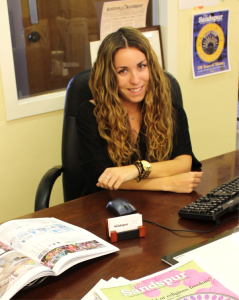They seek out the seediest motels, the motels in the worst parts of town, the motels that rent rooms by the hour, the motels where victims of trafficking are likely to be. They are members of the anti-trafficking group, S.O.A.P. (Save Our Adolescents from Prostitution). S.O.A.P members go to these motels to deliver specially marked bars of soap to guests’ bathrooms among the other travel-sized toiletries assorted on the counter. The message, “Are you being forced to do anything you do not want to do?” and the toll free National Human Trafficking Hotline Number are written across a red label affixed to the ordinarily innocuous bars of motel soap. The motels save money by placing these bars of soap in their rooms, and the message can hopefully be one that saves a life.
S.O.A.P. was started by Theresa Flores, a survivor of trafficking herself, as a way to make a difference by providing a possible way out for victims who often do not have anywhere to turn for help. She came up with the idea after thinking about what may have curtailed the years she spent being trafficked by a boy she met in her Michigan high school. In an interview with The Detroit Free Press, Flores recounted the moments from her past that lead her to pursue this passion today. When Flores became trafficked, the term “human trafficking” had yet to become recognized by mainstream America as a serious criminal offense, which contributed to the difficulty she faced in escaping her captors. “Whenever I got up the nerve to do something, I hit a brick wall,” Flores divulged.
S.O.A.P.’s mission does not stop at providing victims with a number to call for help, but the outreach program also educates high-risk motels and hotels on how to identify and report sex trafficking when they see it in their establishments. The trained volunteers schedule their visits around high-demand events like the Super Bowl, NCAA finals, the Indy 500 among several others potentially associated with sharp raises in trafficking incidents. Eighty to one hundred percent of hotels and motels accept the soap from S.O.A.P. volunteers and hotel staff has identified at least one missing child during each outreach. Additionally, The Polaris Project, a non-profit organization that works to combat all forms of human trafficking, reports dramatic increases in calls to their tip line during outreaches.
The group has active “teams” in communities all over the country. S.O.A.P. encourages businesses, companies, church small groups, college and high school groups, elected officials, survivors, and virtually anyone interested in furthering the group’s efforts to become involved through purchasing their own case of soap to label and donate back. Outreaches can even be completed with a single S.O.A.P. Training and Instructional DVD. Just $200 covers the cost of one case of 1000 bars of soap with special labels, S.O.A.P. bags, folders, and a DVD and educational materials. S.O.A.P. appears to make becoming a local team member an entirely obtainable feat, thus allowing for the group’s efforts to be felt in increasing numbers throughout some of the highest risk communities in the United States.
S.O.A.P. delivers crucial information directly to victims of human trafficking, without compromising their safety. It is a common-sense, yet intensely creative approach to educate motel staff, who likely interact with traffickers and trafficking victims on a weekly basis, while also providing them with an incentive to cooperate through offering soap for their business free of charge. Additionally, because of S.O.A.P.’s ingeniously simple premise, any community member or civic group can partake without intensive training or significant financial contribution. If a modest bar of motel soap can deliver a potentially lifesaving message to a victim of trafficking, there is hope that with a little ingenuity and a lot of passion, the efforts of people like Theresa Flores will begin to dismantle trafficking, one good idea at a time.
Related: The CSE Institute recently published a policy paper detailing the hotel industry’s potential liability in sex trafficking cases. For more information, visit: http://cseinstitute.org/new-policy-paper-liability-hotel-industry/
Jamie Pizzi is currently a first-year law student at the Villanova University Charles Widger School of Law. Jamie is from Palm City, Florida and received her undergraduate degree in Anthropology and Political Science from Rollins College. After graduation, Jamie would like to do public interest work related to women’s rights or criminal law.



